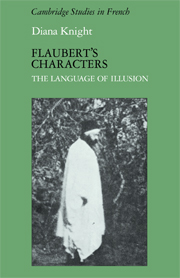Summary
Sartre's masterly account of Flaubert's linguistic adventure shows that an uneasy relationship with words and meaning, pathological in terms of personal biography, had an original and positive function in the creation of an aesthetic – a conception of art that seeks to maintain language as an opaque and autonomous order. It is the extraordinary convergence of recent critical views upon this particular perception of Flaubert that has elevated him to a position as precursor of a now especially prized way of writing. Gérard Genette, for example, characterizing Flaubert's mature prose by its deliberate refusal of eloquence, attributes to him a ‘projet de ne rien dire’ which could be seen as informing one whole movement within modern literature (1963, p. 57). If language should ideally be sensed as opaque, then characters with linguistic difficulties, who permanently sense its opaqueness, have an advantage from an aesthetic point of view. If Flaubert's writing is based on a refusal of eloquence, then fictional characters who lack eloquence deserve an evaluation that takes account of their part in the production of that writing. Is it then possible that all those useless inarticulate characters should take a share in Flaubert's personal triumph, that the likes of Charles and Félicité helped to forge the direction of modern literature?
The parrot Loulou, a rather special inarticulate character, might well stand as an emblem for Flaubert's handling of language.
- Type
- Chapter
- Information
- Flaubert's CharactersThe Language of Illusion, pp. 41 - 54Publisher: Cambridge University PressPrint publication year: 1985



